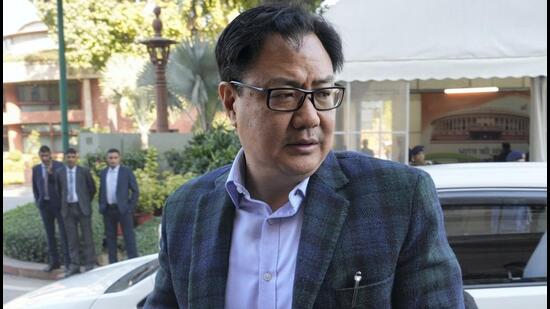Kiren Rijiju's response on vacancies in judiciary and pendency of cases
Union law minister Kiren Rijiju informed the Rajya Sabha that the issue of vacancies and appointments in the higher judiciary would remain a challenge till the time a new system of appointments is created to address the problem.
Union law minister Kiren Rijiju on Thursday opened a new front in the ongoing exchange of words between the judiciary and the executive on the methodology of appointments to constitutional courts, when he informed the Rajya Sabha that the issue of vacancies and appointments in the higher judiciary would remain a challenge till the time a new system of appointments is created to address the problem.

The minister also pinned the blame for the staggering pendency of cases on the vacancies in the judiciary.
Responding to a question by Congress lawmaker Rajeev Shukla on the pendency of cases in courts, the law minister said the government has limited power vis-a-vis appointment of judges. Shukla sought to know whether the Union government had a roadmap to deal with the issue of pendency of cases in courts across the country.
“Currently, the government has limited powers to fill the vacancies... other than considering the names recommended by the collegium, the government does not have the mandate to look for other names,” the minister said.
Citing the steps being taken by the government to address the issue of pendency of cases, Rijiju said the Centre has from time to time conveyed to the chief justices of the Supreme Court and the high courts, both orally and through writing, the need to fill vacancies. “We also convey that the names recommended should be of a certain quality and also represent India’s diversity taking into account gender, caste and religion,” he said.
He added that though there is a view that the issue is not being handled as per the “sentiments of the house and the people”, he would refrain from commenting too much on the functioning of the court as it could lead to a perception that the government is interfering in the functioning of the judiciary.
The National Democratic Alliance government’s move to change the way judges are appointed to constitutional courts, through the National Judicial Appointments Commission (NJAC) Act, 2014, was declared unconstitutional by the Supreme Court in 2015.
Since the existing collegium system does not mention a time-frame for the government to approve the collegium’s recommendation, many of the appointments have been delayed.
In recent months, Rijiju has repeatedly criticised the system, in one instance terming it “opaque”. In response, a bench of the Supreme Court said that the government has to follow the law of the land. On November 28, a bench, led by justice Sanjay Kishan Kaul, said the Centre cannot “frustrate the entire system” just because it is “unhappy” about its legislation on judicial appointments failing to pass the test of constitutionality.
Other constitutional offices have also been drawn into the battle. In his opening address on assuming the office of Rajya Sabha chairperson on December 7, vice-president Jagdeep Dhankar said the Supreme Court’s 2015 judgment striking down the NJAC Act was a “glaring instance” of “severe compromise” of Parliamentary sovereignty and disregard of the “mandate of the people”.
On Thursday, Rijiju pointed out that as per the Constitution, the process and the procedure for appointment of the judges was the right of the government, and the process used to be carried out in consultation with the judiciary. “All this changed after 1993...till the time we change the process of appointing judges, the issue of vacancies and pendency will keep cropping up,” he said. His reference was to the year the collegium system was adopted.
The minister did not give a specific response to a separate question on whether the government would revive the NJAC Act. He, however, said that several retired judges, prominent jurists, advocates, lawyers and leaders of political parties are of the view that the decision to strike down the Act by a five-member Constitution bench of the Supreme Court was not correct.






